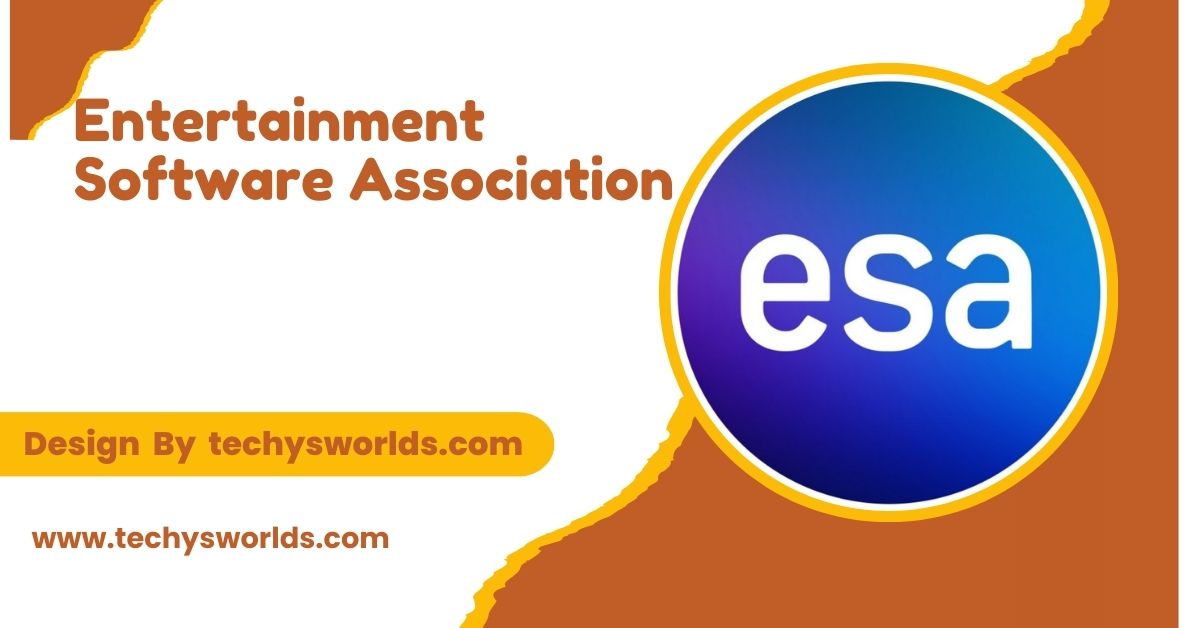The Entertainment Software Association (ESA) advocates for U.S. video game publishers and oversees the ESRB, which provides content ratings to guide consumers.
This article delves into the history, mission, and various functions of the ESA, exploring its impact on the gaming landscape and providing detailed insights into its significance.
Introduction to the ESA:

The Entertainment Software Association, founded in 1994, represents the interests of video game publishers in the United States. As the primary advocate for the gaming industry, the ESA engages in lobbying, public relations, and research efforts aimed at promoting and protecting the video game sector.
Mission and Objectives:
The ESA’s mission is to support and enhance the video game industry. Its objectives include:
- Advocating for policies that benefit the gaming industry at local, state, and federal levels.
- Promoting the cultural and economic significance of video games, highlighting their role in modern entertainment.
- Protecting intellectual property rights to ensure fair competition and innovation.
- Supporting the development of a vibrant gaming ecosystem, fostering new ideas and collaborations.
Historical Background:
The ESA emerged from the need for a collective voice for video game publishers.
Also Read: Sheppard Software – A Comprehensive Overview!
Origins and Formation
- Established in response to increasing regulatory pressures and public scrutiny surrounding video game content.
- Originally known as the Interactive Digital Software Association (IDSA), the organization was formed to represent publishers and developers.
- Renamed to the Entertainment Software Association in 2000, reflecting a broader focus on entertainment beyond just interactive software.
Key Milestones:
- Launch of the Entertainment Software Rating Board (ESRB) in 1997, which standardized content ratings for video games.
- Development of initiatives to combat video game piracy, which was rampant in the early 2000s, undermining the industry’s growth.
- Increased involvement in legislative advocacy and public policy discussions, particularly around issues like online privacy, copyright, and consumer protection.
Entertainment Software Association Jobs:
- Collaborate on policies shaping the future of the video game industry.
- Engage in advocacy efforts to support gaming innovation and creativity.
- Work alongside industry leaders to address emerging challenges.
- Contribute to public relations campaigns promoting gaming’s cultural impact.
- Explore opportunities in technology, policy, and community engagement at ESA.
- Be part of a team driving the growth of a dynamic global industry.
- Enhance professional skills in a cutting-edge, entertainment-focused organization.
- Access networking opportunities with top gaming professionals.
- Influence the conversation on gaming’s role in education and technology.
- Build a career supporting a thriving and innovative industry ecosystem.
The Role of the ESA in the Gaming Industry:

The ESA serves multiple roles, each contributing to the overall health of the gaming ecosystem.
Advocacy and Representation:
The ESA actively lobbies on behalf of its members, engaging with government officials and stakeholders.
- Represents over 30 leading video game publishers, including major players like Electronic Arts, Activision Blizzard, and Take-Two Interactive.
- Advocates for fair regulation and industry practices, working to influence policy decisions that affect the gaming landscape.
- Engages in educational efforts to inform policymakers about gaming issues, promoting understanding of the industry’s positive contributions.
Research and Data:
The ESA conducts extensive research to provide insights into the gaming industry, showcasing its growth and influence.
- Publishes annual reports on gaming trends, demographics, and market performance, highlighting key statistics such as player age, gender, and spending habits.
- Offers data on the economic contributions of the gaming sector, including job creation, tax revenues, and community engagement.
- Analyzes consumer behavior and preferences, which helps shape industry strategies and product development.
Public Relations and Community Engagement
The ESA plays a crucial role in shaping the public perception of video games.
- Promotes positive stories about gaming and its impact on society, focusing on aspects like education, health, and community building.
- Engages in community outreach and educational programs, such as partnerships with schools to promote game design and development.
- Supports initiatives that highlight the benefits of gaming, including mental health awareness and cognitive skill development.
The Entertainment Software Rating Board (ESRB):
One of the ESA’s most significant contributions is the establishment of the ESRB, which rates video games for content appropriateness.
Also Read: Kuta Software Infinite Algebra 1 – A Vital Tool!
Purpose of the ESRB:
The ESRB aims to inform consumers about the content of video games.
- Provides age ratings and content descriptors that guide consumers in making informed purchasing decisions.
- Helps parents navigate the gaming landscape, ensuring they understand the suitability of games for their children.
- Encourages responsible gaming practices, promoting awareness of game content and its implications.
The Rating Process:
The process of rating a game involves several steps:
- Developers submit their games for review along with relevant content information.
- Trained raters evaluate content against established criteria, including factors such as violence, language, and sexual content.
- Ratings are assigned based on a comprehensive assessment, ensuring transparency and reliability in the rating system.
Impact of the ESRB:
- The ESRB has become a trusted source for consumers, with a high recognition rate among parents.
- Its ratings have contributed to a culture of responsibility in gaming, encouraging dialogue between parents and children about media consumption.
- The ESRB has adapted to changing gaming formats, including mobile games and downloadable content, maintaining relevance in a dynamic industry.
Economic Impact of the Gaming Industry:

The ESA highlights the significant economic contributions of the gaming industry to the U.S. economy.
Revenue Generation:
Video games generate substantial revenue, making them a vital sector.
- The U.S. video game industry generated over $90 billion in revenue in 2020, a figure that has continued to rise.
- Growth driven by digital sales, subscriptions, and in-game purchases, which now account for a large portion of total revenue.
- Increasing global market opportunities for U.S. publishers, with international markets expanding rapidly.
Job Creation
The gaming industry is a significant source of employment.
- Supports over 400,000 jobs in the U.S., encompassing a range of roles from development to marketing and distribution.
- Jobs span various sectors, including programming, art and design, sound engineering, and business operations.
- Fosters innovation and creativity in the workforce, with a focus on STEM education and professional development.
Contributions to Local Economies:
The ESA emphasizes the local economic impact of the gaming industry.
- Video game companies contribute to local economies through job creation and increased consumer spending.
- Many gaming studios engage in community initiatives, supporting local charities and educational programs.
- The industry promotes tourism, with major gaming events and conventions attracting visitors from around the world.
Legislative and Regulatory Advocacy:
The ESA engages in advocacy to influence legislation that affects the gaming industry.
Also Read: Missed Call Text Back Software Free – Key Features and Benefits!
Key Legislative Areas:
The ESA focuses on several critical areas:
- Intellectual property protection, which is essential for fostering innovation and creativity in game development.
- Online privacy and security, advocating for robust protections for consumers, particularly minors engaging in online gaming.
- Regulation of video game content, working to ensure fair treatment in comparison to other entertainment mediums.
Challenges and Responses:
The gaming industry faces numerous challenges from regulators and lawmakers.
- Combating misinformation about gaming effects, particularly concerning violence and addiction, through public education campaigns.
- Addressing concerns over loot boxes and microtransactions, with calls for transparency and consumer protection.
- Navigating issues related to online gaming safety, advocating for measures that protect players from harassment and exploitation.
Community and Educational Initiatives:

The ESA is committed to fostering a positive gaming culture through various initiatives.
ESA Foundation:
The ESA Foundation supports charitable activities and educational programs.
- Focuses on using gaming for social good, including initiatives that leverage video games for educational and therapeutic purposes.
- Provides scholarships and grants to promote diversity in the industry, particularly for underrepresented groups in tech and gaming.
- Partners with organizations to enhance community engagement, driving awareness of gaming’s benefits beyond entertainment.
Advocacy for Diversity and Inclusion:
The ESA champions diversity within the gaming industry.
- Supports initiatives to increase representation of women and minorities in gaming development and leadership roles.
- Promotes inclusive workplace practices, encouraging companies to adopt policies that foster diversity and combat discrimination.
- Engages in outreach to underrepresented communities, providing resources and mentorship to aspiring game developers.
The Future of the ESA:
As the gaming industry evolves, the ESA adapts to new challenges and opportunities.
Embracing Technological Advances:
The rapid pace of technological innovation presents both challenges and opportunities.
- Focus on emerging technologies like virtual reality (VR) and augmented reality (AR), advocating for responsible use and industry standards.
- Support for developers embracing innovation, ensuring that new technologies are accessible and beneficial to all players.
- Engagement with tech companies to explore the integration of AI and machine learning in game development and user experience.
Expanding Global Reach:
The ESA recognizes the importance of a global perspective in the gaming industry.
- Collaboration with international partners and organizations to address global gaming issues, such as regulation and intellectual property.
- Advocacy for fair trade practices in global markets, ensuring that U.S. companies can compete on a level playing field.
- Engagement in global discussions on gaming policies, promoting cooperation and understanding among countries.
Addressing Social Issues:
The ESA is increasingly focused on addressing social issues related to gaming.
- Engaging in discussions about mental health and gaming, advocating for resources and support for gamers.
- Promoting initiatives that highlight the positive impact of gaming on social skills, cognitive development, and community building.
- Working with researchers to better understand the societal effects of gaming, using data to inform policy and public perceptions.
FAQ’s
1. What is the primary purpose of the ESA?
The ESA advocates for U.S. video game publishers and promotes beneficial policies.
2. What is the ESRB?
The ESRB rates video games for content, providing age ratings and descriptors.
3. Who does the ESA represent?
The ESA represents over 30 major video game publishers, including Electronic Arts and Activision Blizzard.
4. How does the ESA support diversity?
The ESA promotes diversity through scholarships and initiatives for underrepresented groups.
5. What research does the ESA conduct?
The ESA conducts research on gaming trends and demographics, publishing annual reports on industry impact.
6. How has the ESA influenced gaming regulations?
The ESA advocates for fair regulations on intellectual property, online privacy, and video game content, ensuring industry protection and growth.
7. What is the ESA Foundation’s mission?
The ESA Foundation supports charitable and educational programs, focusing on diversity, using gaming for social good, and fostering engagement in the gaming community.
8. How is the ESA adapting to technological advances?
The ESA embraces emerging technologies like virtual reality (VR) and augmented reality (AR), supporting responsible innovation and industry standards.
Conclusion
The Entertainment Software Association plays a crucial role in the video game industry by advocating for publishers, promoting responsible gaming, and supporting diversity. Through its initiatives, including the ESRB, the ESA helps shape policies and public perceptions, ensuring a vibrant and innovative gaming landscape for future generations.
Related Posts
Also Read: Are Old Animation Softwares Eaiser To Use – A Detailed Comparison!
Also Read: What Internet Radio Software does Frontier Smart Technologies Use – A Guide!



